Archives
-
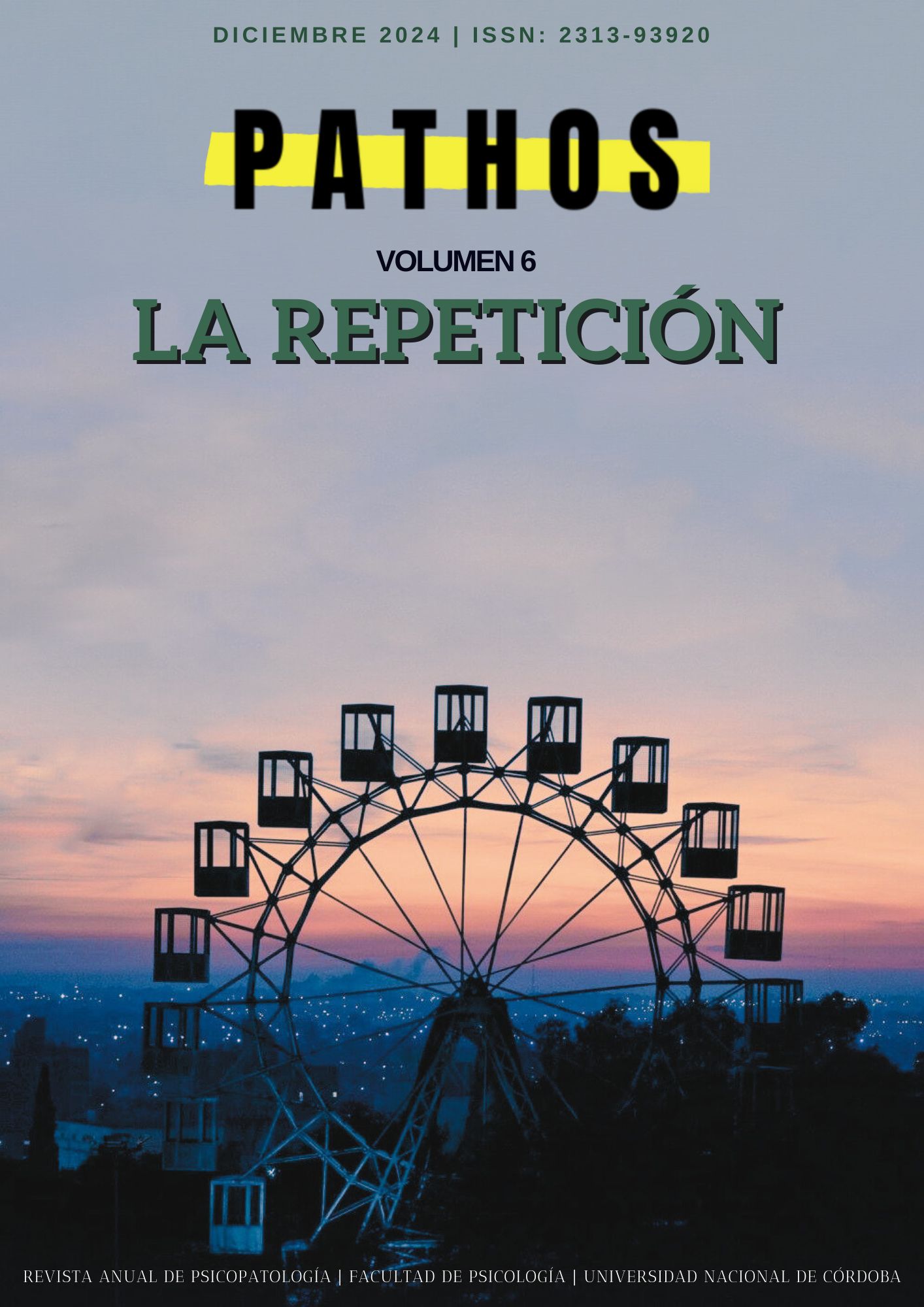
Repetition
Vol. 6 (2024)With great enthusiasm and pride, we present the sixth issue of Pathos, the academic journal of the National University of Córdoba, whose Dossier is dedicated this time to the concept of repetition. This term, fundamental in psychoanalysis, serves as a privileged axis for both theorization and clinical practice. In this issue, we aim to transcend reductionist perspectives that confine repetition to mere iteration or descriptive phenomena, opening the way to an in-depth exploration of its implications within Freudian and Lacanian thought.
Following Freud, this issue revisits the two major articulations of the concept of repetition: its link with transference and its connection with compulsion beyond the pleasure principle. From repetition that manifests as enactment within the field of transference to the compulsion rooted in the pulsional insistence of the traumatic, the collected articles engage with these classic formulations, demonstrating how repetition traverses both the domain of desire and that of the death drive. At the same time, the articles invite a rethinking of how Lacan, far from merely replicating Freud, renews the concept by articulating it with notions such as the unary trait, the insistence of the signifying chain, and the categories of tyché and automaton.
In addition to the Dossier articles, this issue includes free papers that address topics enriching the psychoanalytic horizon, such as topology, time, and the sinthome. With this edition, Pathos reaffirms its commitment to rigorous academic production, inviting readers and specialists to participate in a fertile dialogue about the challenges posed by repetition in its multiple facets. We welcome you to this space of reflection and debate, hoping that the ideas developed here inspire new questions and developments.
-
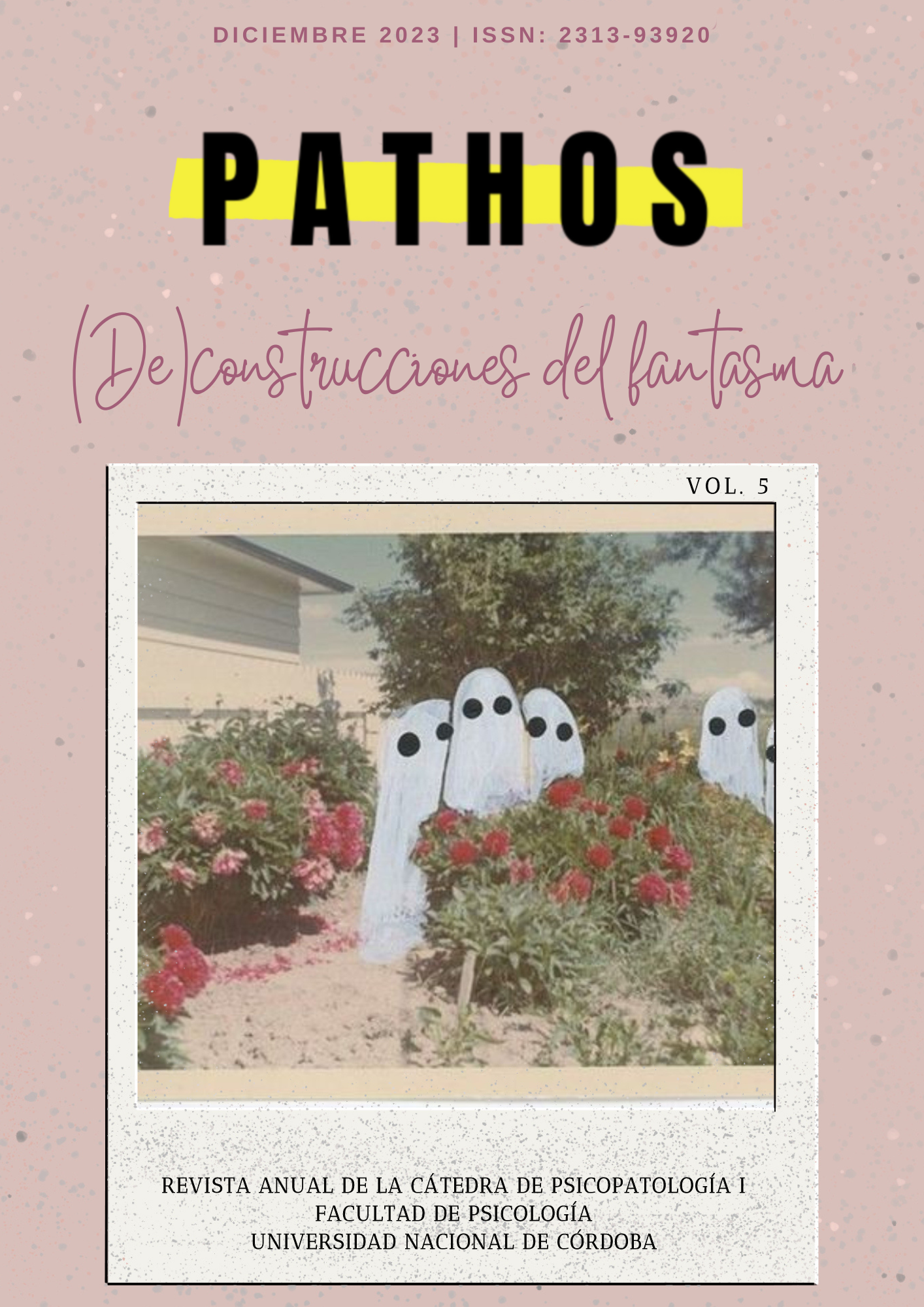
(De)constructions of the phantasy
Vol. 5 (2023)Lacan's concept of fantasme is rooted in the notion of "phantasy" that both Freud and Melanie Klein have used. However, Lacan builds on these foundations to develop an original and disruptive conceptualisation, which, far from being a monolithic and linear elaboration, on the contrary, presents an approach with scans, nuances and paths that will construct and (de)construct meanings, ways of understanding and articulating the notion that will influence theory and analytic praxis.
(De)constructing the fantasme, impels us to investigate and explore a "fascinating scenario" of crucial importance for psychoanalysis and psychoanalysts, which crosses its conceptual and clinical variations. In this issue, we enthusiastically invite you to explore, assemble and disassemble this scene, understanding that psychoanalysis is not about the reality of a story, but about a fictional structure that is put into action. As Lacan wrote: "That the subject relives, remembers, in the intuitive sense of the word, the formative events of his existence, is not in itself so important. What counts is what he reconstructs from them".
-
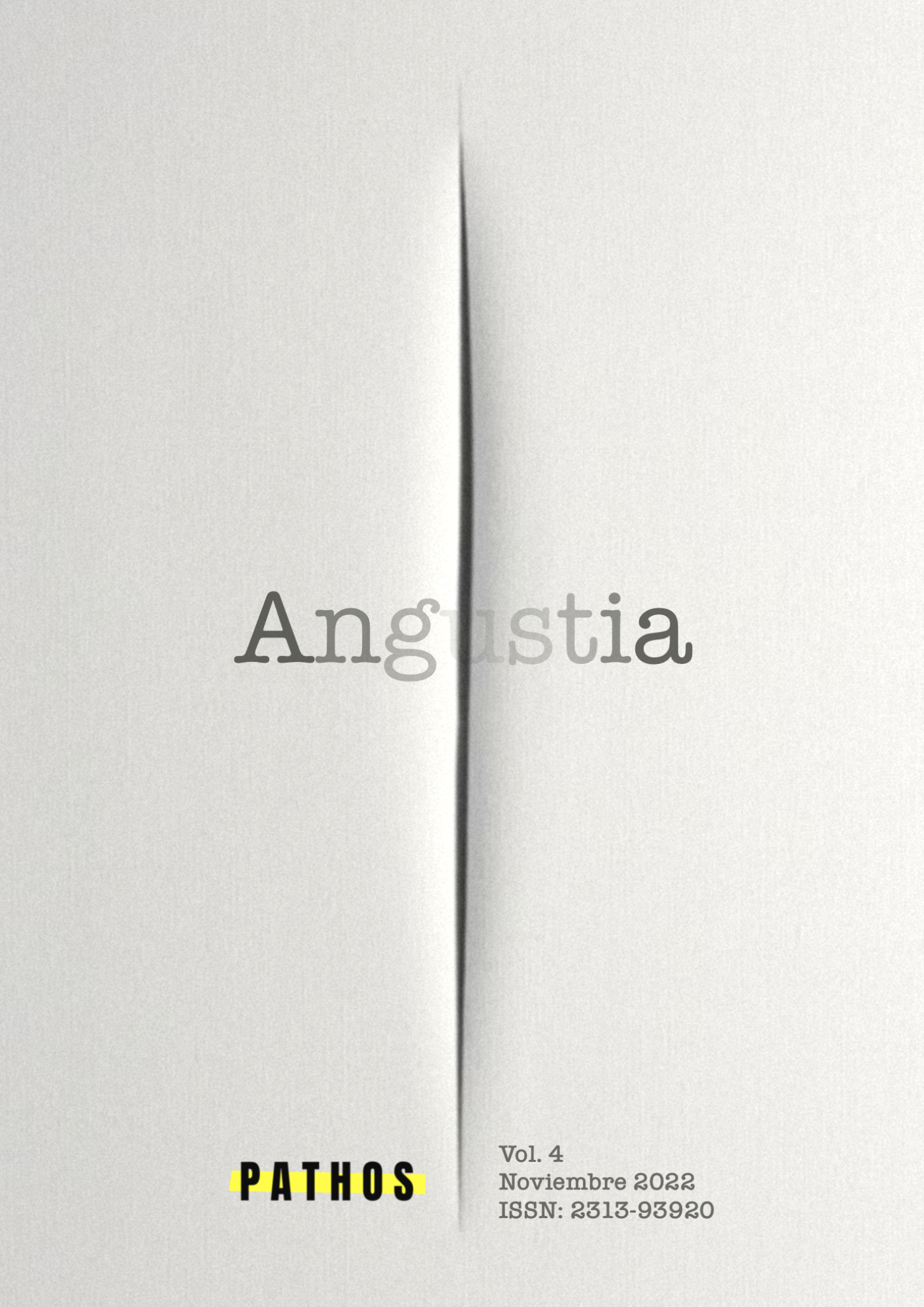
Anguish
Vol. 4 (2022)In the class of 14 November 1962, Lacan proposes to begin to speak of anguish, the axis that his tenth seminar will take. He justifies this choice because he considers that anguish will be the meeting point with everything he had previously been working on, proposing an articulation that will make it clear that, starting from anguish, each term, concept and previous elaboration will better occupy its place both in theory and in practice.
Thus, at the beginning of 1962, he began a series of classes that would give rise to the elaboration of what Lacan would determine, as his only true contribution to psychoanalysis, the object a and link it to the appearance of anguish as a sign that the lack is missing, relating this to his conception of the subject.
In this fourth issue of Pathos we intend to celebrate the 60th anniversary of Lacan's first lecture on the seminar on anguish, bringing anguish into the light of the articles proposed by different authors on the subject.
Anguish will be the axis that brings together the papers, creating a network of its own in each article, in which each author becomes a funambulist who dares to walk the rope of the written word, the void, where it is lodged, and the free papers propose to continue betting on a psychoanalysis that is debating with the present, researching, building a theory that feeds the practice and a practice that builds theory, to sustain the spirit of psychoanalysis.
-
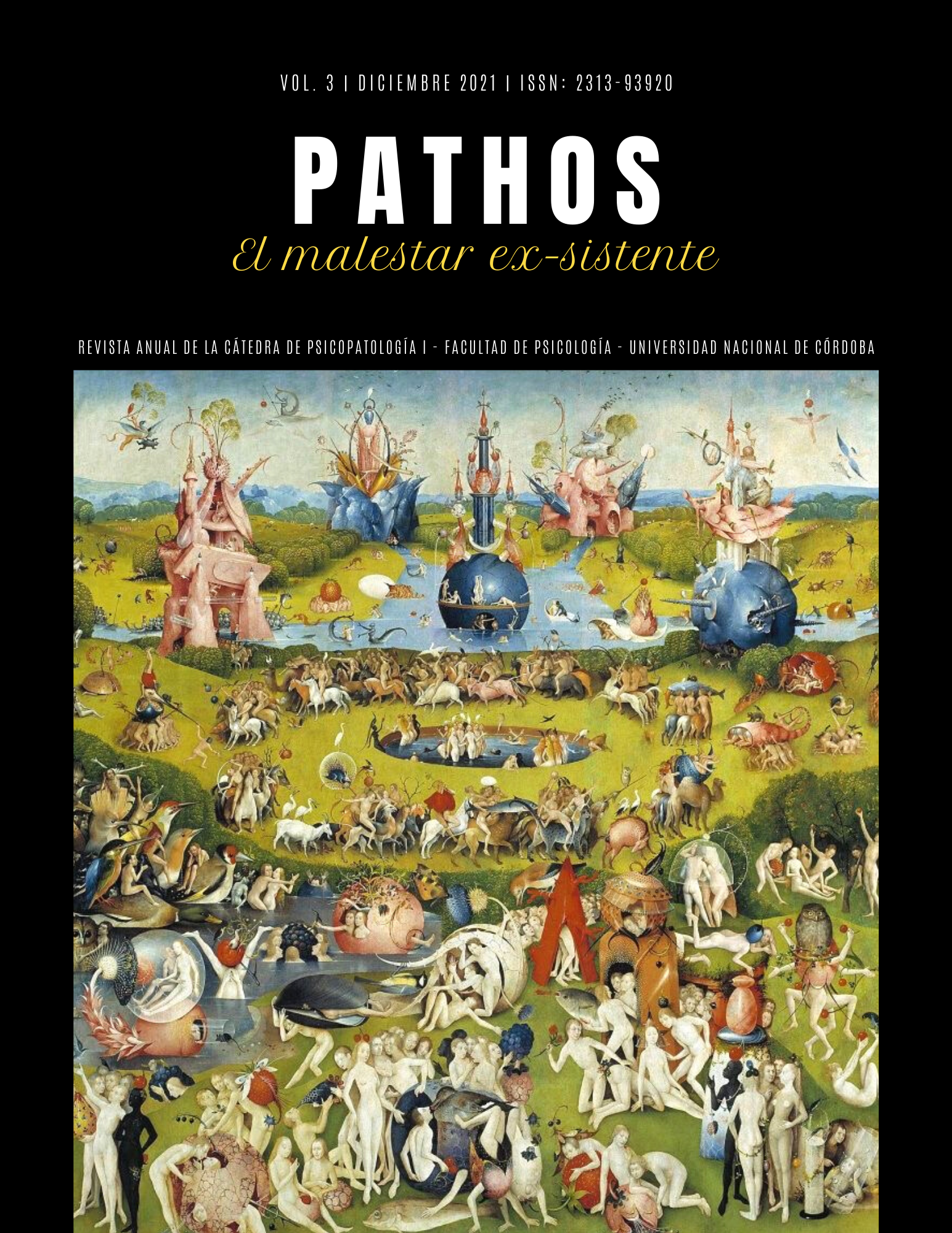
Ex-sitant discomfort
Vol. 3 (2021)The drive for destruction, as a concept prínceps of Freudian eroticism, points out the radical gap existing between the hard data of biology and the symbolic nature that founds the power of desire against the grain of self-preservation. Thus the inextricable relationship between the death drive and the social bond has been naively reduced to a non-specific "malaise" or pure dichotomy, which strips it of its paradoxical nature.
It is not new that the history of thought after Freud's so-called "socio-anthropological" texts has had serious difficulties in explaining the juncture of social experience and the logic of the unconscious, a task that led Lacan, in his return to Freud, to postulate his concept of Discourse.
Perhaps it would be abusive to affirm that this concept summarizes all the significant relations that, overdetermined by culture, condition not only the modalities and vicissitudes of the conformation of the subject, but also those of the social bond. However, we insist that there is a constructive collision between both traditions, which far from leading to cynicism or indifference to social experience, places us in the difficulty of thinking them together and insists on their failed encounters.
One of the implications derived from the practice of psychoanalysis is the elucidation of the category "human nature", especially in relation to the specificity of human satisfaction and its detours, the vicissitudes of sexuality and the encounter with the Other, stripped of the nature-culture opposition.
In the current social conjuncture, traversed by the COVID19 pandemic, the consideration of the ex-istente malaise implies attending to the singular interpretation and the productions of the unconscious. In this sense, we can affirm that the Freudian malaise and the logic of discourses are reconfigured and take on new dimensions in the threat of the virus and the subjective effects of the death drive. On the other hand, the radicalization of certain political discourses on freedoms or social restrictions, the crystallization of debates on the responses of science in contexts of high uncertainty or the scant attention to the social and subjective effects of the pandemic, in the face of the imminence of vital risk, show processes of segregation and social fragmentation in frank growth that require attention and analysis in their multiple consequences and conditioners of the contemporary social bond.
-
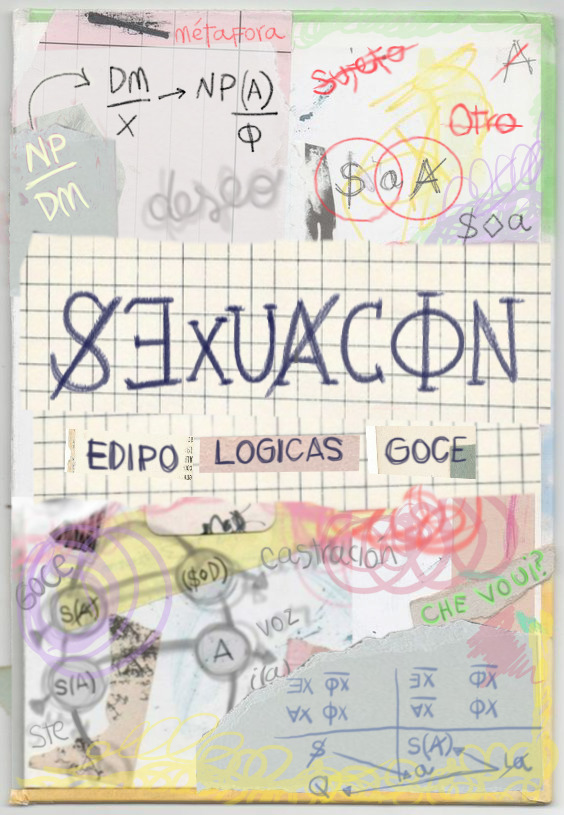
Sexuation. Oedipus, logics, jouissance
Vol. 2 (2020)With the tragic myth of Sophocles' Oedipus, Freud manages to establish the hypothesis of the universal Oedipus Complex and its consequences for sexuality. The Oedipal father appears as the one who carries the threat of castration before the intention of incest, proposing the exogamous exit of the family nucleus. Freud, in texts such as "Totem and Taboo" and "Moses and the Monotheistic Religion", presents the father as a powerful figure who represents the Law for all.
Lacan will approach the Oedipus Complex as a metaphor, in which one signifier is replaced by another. He proposes the Name of the Father as the privileged signifier that organizes the new signification that results from that symbolic operation. However, Lacan has always been aware that this is a way of typifying sexuality, but that it is not the only one, since there is no being of sex. The intervention of language will produce a subject in lack, as a void of signification around sexuality, outside of any possibility of saying what is a woman and what is a man. As a production, a subject will be left trying to border this hole, to construct a knowledge of his unconscious truth that refers to saying something about this void.
From the invention of the object a, Lacan advanced in his teaching by proposing a new logical path for the process of sexuation different from the Paternal Metaphor. In the seventies, he unfolds it with the tables of sexuation and with the axiom of the absence of sexual proportion or relation in the human species.
With the hypothesis of the unconscious and with the denaturalization of the sexes by language, psychoanalysis opened a new field of research. Nowadays, new actors and discourses have come to the fore, fervently questioning this territory, a fact that has prompted psychoanalysis and psychoanalysts to question their praxis and foundations as well. Hence, in this issue we propose to open a space to continue exploring such a broad but intimate terrain as the issue of sexuation.
-
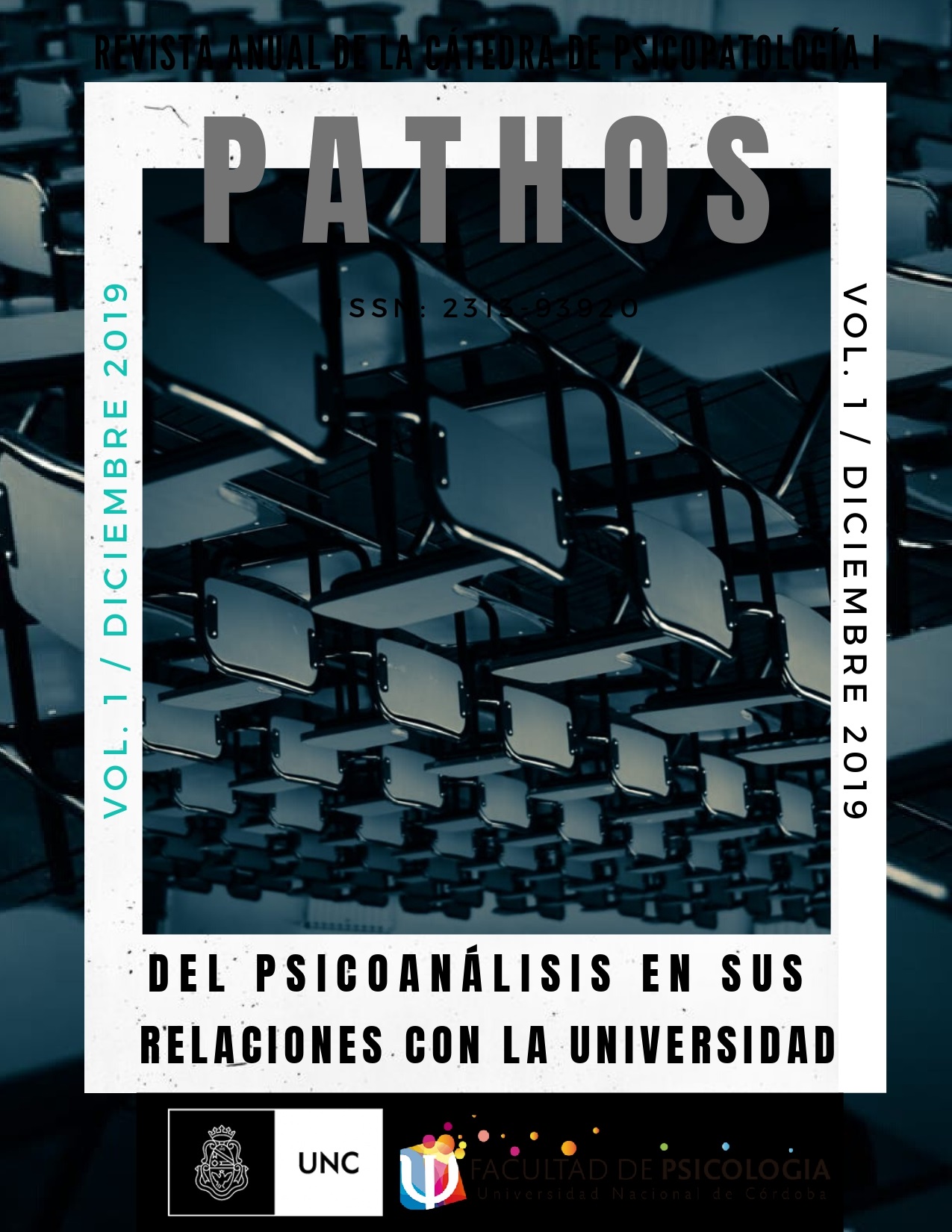
Of psychoanalysis in its relations with the University
Vol. 1 (2019)At present, the relationship between psychoanalysis and the University has new edges to be explored. Some of them range from the discussion about the position on teaching to questions related to the contents taught, or the training of the psychoanalyst. These relationships also imply discussing the progress of Psychoanalysis; perhaps we find ourselves at a juncture in which much of the novelty, of psychoanalysis' responses to the malaise of culture, come from university settings. In this context, the challenge of Pathos goes in this direction, it is a bet that is beginning to be played.









